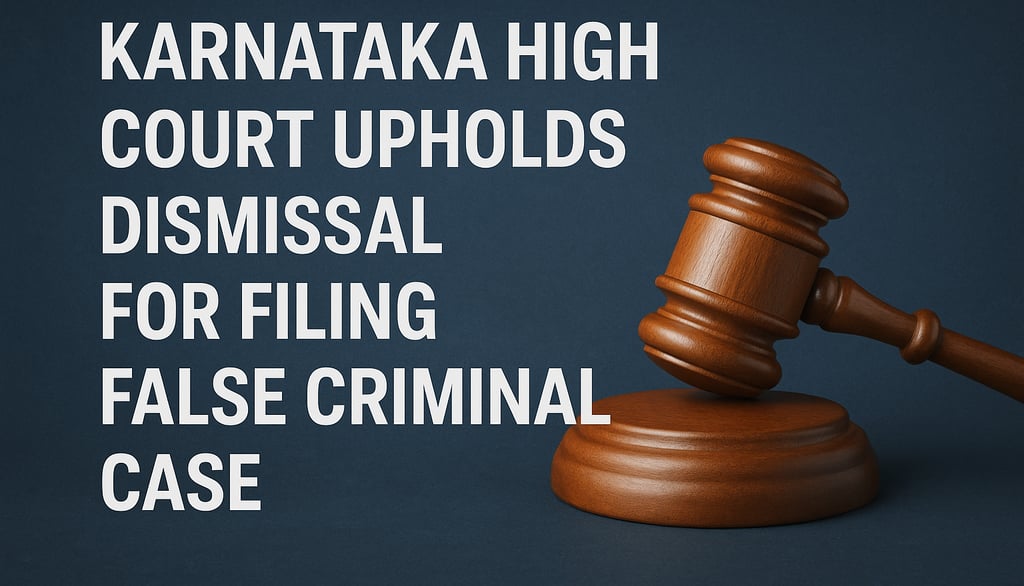Karnataka High Court Upholds Dismissal for Filing False Criminal Case: A Wake-up Call for Workplace Integrity
The Karnataka High Court, in G. Mahesh vs. Teknic Euchner Electronics Pvt. Ltd., upheld the dismissal of an employee who filed a false criminal case against his manager, emphasizing that trust is the foundation of employment. This judgment reinforces that malicious complaints amount to serious misconduct and justify termination when due process is followed. For HR professionals, it’s a reminder to maintain ethical grievance mechanisms and ensure fairness while upholding workplace integrity.
DISCIPLIANRY ACTION
A. Surendranath, Sr HR & IR Professional
10/12/20253 min read


Case: G. Mahesh vs. Management of M/s Teknic Euchner Electronics Pvt. Ltd.
Introduction
In a recent judgment, the Karnataka High Court upheld the dismissal of an employee who had filed a false criminal case against his manager, ruling that such conduct amounted to serious misconduct and justified termination. The case, G. Mahesh vs. Management of M/s Teknic Euchner Electronics Pvt. Ltd., provides critical insights into the balance between employee rights and the employer’s obligation to maintain discipline and trust within the organization.
2. Background of the Case
The petitioner, G. Mahesh, was employed with Teknic Euchner Electronics Pvt. Ltd. During his tenure, he allegedly filed a criminal complaint against his reporting manager, accusing him of harassment and misconduct. Upon investigation, the complaint was found to be false and malicious, leading to a departmental enquiry initiated by the management. The enquiry concluded that Mahesh’s allegations were fabricated with an intent to defame his superior and disrupt workplace harmony. Based on the enquiry findings, the management decided to terminate his services. Mahesh challenged his dismissal before the Labour Court, contending that his action was a result of workplace grievances and that the management had acted vindictively.
Labour Court’s Findings
The Labour Court examined the enquiry proceedings and confirmed that:
The domestic enquiry was fair and proper.
Adequate opportunity was given to the employee to defend himself.
The charge of filing a false criminal complaint was proved.
However, the Labour Court partially sympathized with the employee, observing that the punishment of dismissal could be disproportionate and directed reinstatement without back wages.
Management’s Appeal and High Court’s View
Aggrieved by the Labour Court’s direction of reinstatement, the management approached the Karnataka High Court, arguing that the employee’s conduct amounted to serious moral misconduct. Trust and discipline are central to the employer–employee relationship, and reinstating such an employee would undermine managerial authority and workplace order. The High Court agreed with the management’s stand, emphasizing that filing a false criminal case against a superior officer goes beyond ordinary indiscipline—it attacks the core trust and integrity essential in an employment relationship.
Key Judicial Observations
The Hon’ble Court made several important observations:
False accusations damage trust: Once an employee levels false criminal charges, the employer cannot be expected to continue the relationship of confidence.
Serious misconduct: Such behavior qualifies as a grave misconduct, warranting the highest disciplinary penalty — dismissal.
No leniency warranted: The principle of proportionality does not apply in cases involving dishonesty or malafide intent.
Reinstatement inappropriate: Even if reinstated, the working relationship would remain strained, defeating organizational harmony.
Hence, the High Court set aside the Labour Court’s order and upheld the dismissal as justified and proportionate.
Legal Significance of the Judgment
This ruling reinforces the principle that workplace trust and discipline are non-negotiable. False allegations against superiors or colleagues can amount to misconduct under Standing Orders or Certified Service Rules. Employers have the right to act decisively when such behavior is proven through a fair enquiry. The decision aligns with previous judgments of the Supreme Court where loss of confidence and false allegations were held as valid grounds for dismissal.
Takeaways for Employers
Document Misconduct Properly: Always conduct a fair and well-documented domestic enquiry before taking disciplinary action.
Maintain Integrity of Process: Ensure natural justice by issuing charge sheet, allowing representation, and providing enquiry report to the employee.
Treat False Allegations Seriously: Filing malicious complaints or false criminal cases can be treated as major misconduct.
Preserve Workplace Harmony: Swift and lawful disciplinary action reinforces confidence and discipline.
Avoid Emotional Decisions: Ensure all actions are backed by evidence and procedural fairness.
Proactive Action Points for HR Professionals
This case also carries strong messages for HR practitioners who act as the bridge between management and employees. They are required focus on the below areas:
Policy Framework: Update the Code of Conduct and Standing Orders to include false or malicious complaints as misconduct.
Manager Training: Train managers on handling complaints with empathy and proper documentation.
Complaint Redressal Mechanism: Strengthen grievance and POSH mechanisms to ensure employees feel heard.
Legal Compliance: Coordinate with legal advisors before initiating disciplinary action involving criminal allegations.
Employee Counselling : Offer counselling or mediation channels to resolve conflicts early.
Communication: Reinforce a culture of ethics and respect through periodic training and communication.
Conclusion
The Karnataka High Court’s ruling in G. Mahesh vs. Teknic Euchner Electronics Pvt. Ltd. sends a strong message — malicious use of criminal complaints to target managers or colleagues cannot be tolerated in a professional setting. While employees have every right to raise genuine grievances, they must do so truthfully and responsibly. For employers and HR professionals, this judgment underscores the need for a robust disciplinary framework, fair enquiry process, and balanced employee relations strategy to maintain trust and justice at the workplace.
NulIneHR Consulting #198, Spaclance, Suite #1175, Second Floor, CMH Road, Indiaranagar Second Stage, Bengaluru-560138, India. E-Mail: hello@nulinehr.com; GSTIN: APWPS3818K1ZV


